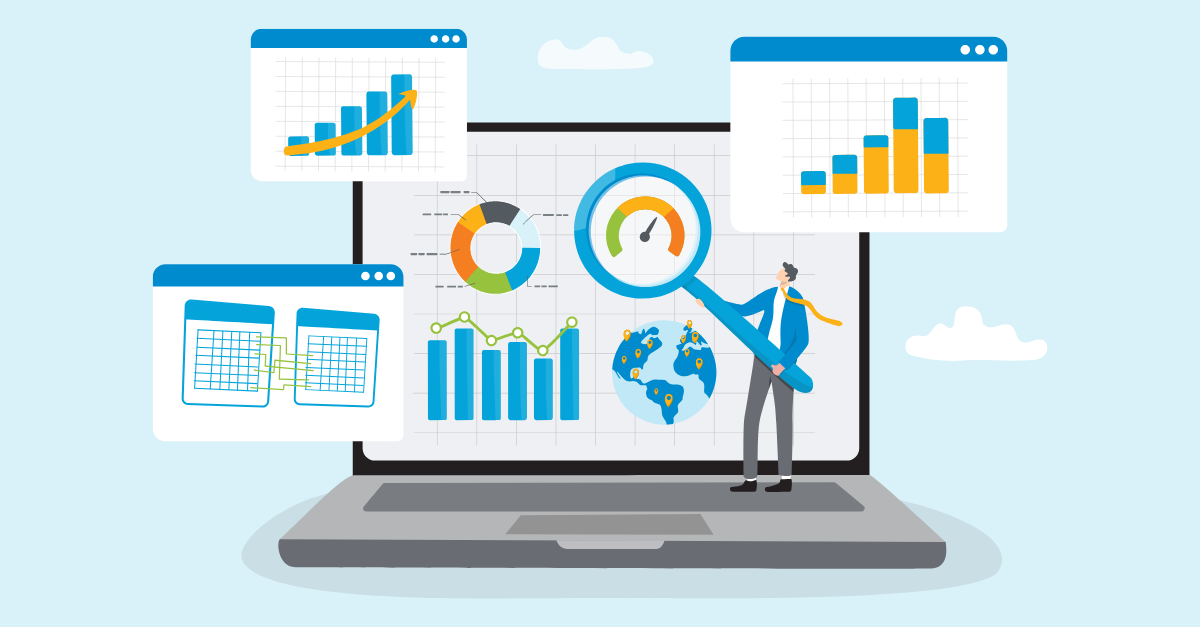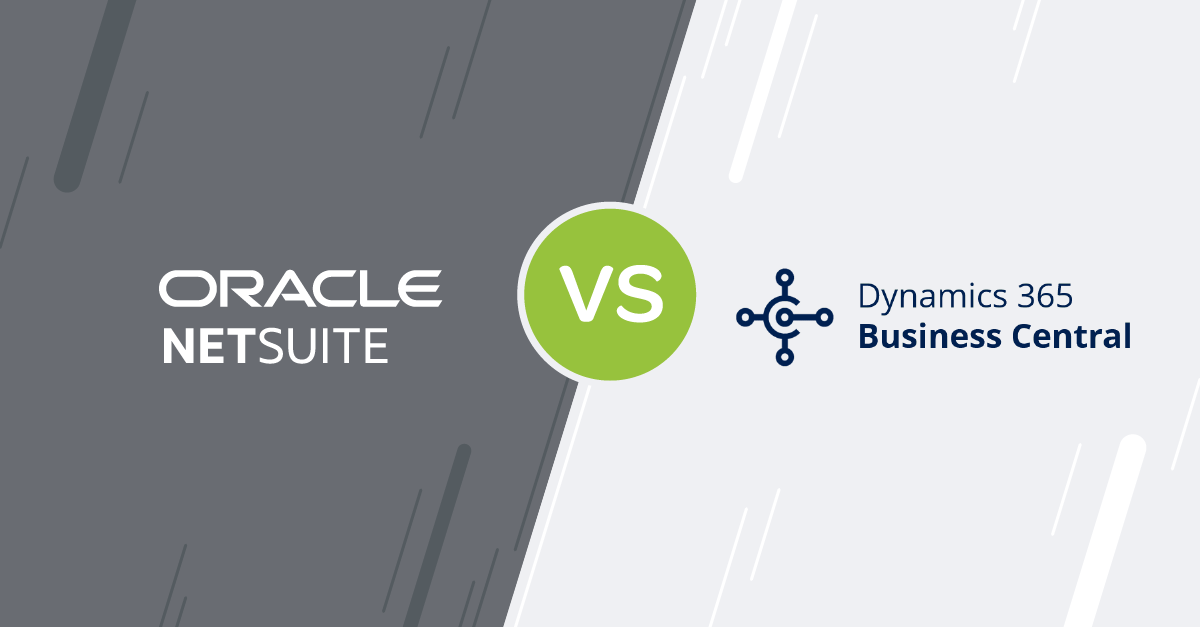Blog
Share this
What is ERP? | Enterprise Resource Planning Explained

by Carly Caines on March 05, 2025
What is ERP?
ERP (or Enterprise Resource Planning) is a category of software that manages the various functions across your business, in one system.
Take a step back and think about all the processes that are essential to running your business – accounting, sales, inventory, purchasing, manufacturing, service, etc. The list goes on based on your business structure. Most small and mid-size companies have a separate application for each of these processes. ERP software changes that approach – it integrates all the functions across your entire organization into one system.
Why do we need ERP?
If you’re considering ERP software, there’s a good reason—growing companies turn to ERP to solve one (or more) of these four challenges. The details may vary, but the core issues remain the same.
1. Disconnected systems
You’re juggling QuickBooks, standalone apps for different departments and countless spreadsheets. Since these disparate systems don’t talk to each other, you spend hours manually reconciling data—leading to errors, delays and unnecessary labor costs.
2. Inefficient processes
Manual tasks slow your team down, making everyday work frustrating and time-consuming. These inefficiencies also impact cash flow—delaying invoicing, extending collection times and ultimately costing you money.
3. Limited visibility
Without visibility into your data, you’re forced to manage by gut feel. If your purchasing team doesn’t know how much of each item is on the shelves, they run the risk of under or over-ordering. Without a clear picture of their sales pipelines, your sales team could miss opportunities to generate revenue. And if you don’t have timely, accurate reporting on revenue, profitability and margins, you’ll find it more challenging to make sound operational decisions.
4. Systems that can’t scale
As your business expands, managing scattered systems becomes a bigger headache. Constant data transfers, inconsistencies and inefficiencies pile up—hindering growth instead of supporting it.
You may be thinking that this sounds awfully familiar, and you're not alone. But that leads us to an important question—how do we use ERP in practice?
Let’s consider a distributor of industrial supplies that sells through both traditional and online channels. When a customer places an order on their ecommerce site, a sales order is automatically created in their ERP system. The financial information flows straight through to accounting so they can process the payment. The order details go to the order management department to pick, pack, ship the order and send a confirmation to the customer. Inventory counts are automatically updated in the system as the order is processed, which then feeds into the purchasing department’s data, so they know what products to order and when. The data automatically flows between departments, because they’re all working in the same system, with the same set of data.
An ERP system brings everything together, giving you the clarity, efficiency and scalability you need to keep growing without the growing pains.
The exact results will vary based on your industry and business structure, but here’s a snapshot of the results companies typically see when they implement ERP:

A brief history of ERP
While the acronym was first coined by Gartner Group in the 1990s, the origins of ERP go back much further. Back in 1913, engineer Ford Whitman Harris developed the economic order quantity (EOQ) model – a paper-based manufacturing system for production scheduling. Then in 1964, toolmaker Black and Decker combined EOQ and a mainframe computer to create a materials resource planning (MRP) solution. This was the manufacturing standard until MRP II was developed in 1983. MRP II featured modules and integrated core manufacturing components, like purchasing, bill of materials, scheduling and contract management.
Moving into the 1990s, the term ERP was used to represent the next evolution that took the software beyond manufacturing. Software vendors began creating applications that addressed all core business functions, like accounting, HR and more. Modern ERP solutions have gone beyond the back end operational functions to include revenue generating processes like sales, ecommerce and marketing automation.
While ERP was traditionally the domain of large enterprises, the perception of ERP cost is changing. Cloud-based solutions make ERP make accessible and for high growth SME’s looking to save money long-term by automating manual tasks, improving inventory management and reducing costly mistakes.
What can you do with ERP?
ERP is a business management software that helps companies collect, store, manage and analyze data from all areas of their operations. By integrating core business processes into one unified system, it eliminates data silos and provides employees at every level with a single source of truth to streamline daily activities and improve efficiency.

- Finance & Accounting: Automate your processes and gain accurate, real-time insights to help you stay on top of tasks and compliance.
- Procurement & Supply Chain: Improve purchasing decisions, strengthen supplier relationships and things flowing smoothly.
- Manufacturing: Stay ahead of production by tracking work orders, managing schedules and ensuring your resources are used to their fullest potential.
- Inventory Management: Gain real-time visibility of inventory levels and automate restocking to avoid over or under-stocking.
- Warehouse Management: Optimize your warehouse operations with precise tracking, faster order fulfillment and more efficient inventory handling.
- Analytics: Make smarter, data-backed decisions with easy-to-understand reports and powerful insights into your business’s performance.
- Project Management: Plan, execute and track all of your projects from start to finish, ensuring on-time delivery and adherence to budgets.
- Service: Provide top-notch customer support by streamlining service requests, scheduling and tracking performance to ensure a high level of satisfaction.
- Ecommerce: Connect your ERP and ecommerce store to improve product management, order processing and customer experience.
- CRM (Sales & Marketing): Automate workflows, track leads and run integrated marketing campaigns that keep customers engaged.
How is ERP software deployed?
There are several ERP deployment models you can choose from. Each one comes with its own considerations and will impact who owns responsibility for system infrastructure, but also how your users interact with the system.
Public cloud
In a public cloud ERP model, your system is hosted by a third-party and users access the system via a web browser. This is a multi-tenant model, meaning more than one company’s system is running in the same technical environment.
Private cloud
With a private cloud ERP deployment, a third-party will host your ERP system and your users access it via a remote desktop. You have a technical environment that’s dedicated to your company, providing added levels of control over your data.
On-premise
An on-premise ERP system is installed and maintained on a local server, within the walls of your building. Users access the system as a desktop application and you’re responsible for server hardware and maintenance.
Hybrid cloud
Hybrid cloud ERP is a combination of public and private cloud (and sometimes on-premise components). You can leverage the benefits of all models based on how your users need to access and interact with the system.
ERP solutions for small businesses
Now you might be wondering — what types of ERP systems are there and how do I decide which one is best for my business?
Choosing the right ERP is a big decision, and we understand how overwhelming the process can be. The best ERP for your business ultimately depends on your industry, budget and growth plans. Here’s a look at the best ERP systems for small businesses and what they do best:
1. NetSuite — Best all-in-one ERP for scalability
NetSuite is a cloud ERP designed for high-growth companies that need flexibility as they expand. With its modular approach, your business can start with a SuiteSuccess implementation for a fast, industry-specific rollout and scale over time by adding native NetSuite modules for advanced financials, inventory, ecommerce and more. Plus, its robust automation, real-time reporting and extensive customization options ensure your ERP evolves alongside your business.
2. SAP Business One — A strong choice for on-premise or private cloud deployment
SAP Business One is a powerful ERP tailored for small to mid-sized manufacturers and wholesale distributors, offering robust inventory and supply chain management alongside comprehensive financial tools. What sets it apart is its flexible deployment options—on-premise or private cloud—giving your business greater control over data, security and system customization. If you prefer to keep your ERP in-house or want a dedicated cloud environment, SAP Business One provides the flexibility to align with your IT strategy.
3. Acumatica – Ideal for service-based and project-oriented businesses
Acumatica is a good option for service-based businesses, construction companies and project-driven industries that require advanced financials and project management tools. Acumatica’s open API structure also makes it easy to integrate with third-party applications.
4. Microsoft Dynamics 365 Business Central – Ideal for businesses already using Microsoft products
Microsoft Business Central is a strong ERP for small businesses that rely on Microsoft tools like Office 365, Power BI and Teams. It offers seamless integration with these products, making it easy to adopt. With strong financials, sales and inventory management, it’s a good fit for businesses looking for a familiar interface and easy connectivity.
5. Odoo – Great for budget-conscious businesses with simple processes
Odoo is an open-source ERP with a modular structure, allowing businesses to start with basic functions and expand as needed. It’s highly customizable and affordable compared to other ERPs, making it a good option for startups and small businesses that have relatively simple processes and the resources to support a higher level of customization.
6. Epicor – Suitable for niche industries and manufacturing
Epicor is a strong contender for small manufacturers, specialty retailers and automotive businesses. It provides deep industry-specific functionality, particularly for businesses with complex production workflows. If you need an ERP tailored to your niche industry, Epicor might be the right fit.
Concerned about whether your ERP will fully meet your needs?
ERP software does a lot out-of-the-box, but every business has unique processes that may require additional functionality. ERP customization allows you to modify the system’s features to better fit your workflows, while ERP system integration extends the capabilities by connecting with other best-of-breed software to create a complete solution.
Both approaches are common and can significantly enhance efficiency—when done strategically. The key is to customize only when necessary and design integrations that ensure seamless data flow across all systems. For the best results, choose an ERP partner with deep expertise in both ERP functionality and software development to ensure a smooth and effective implementation.
Debunking common ERP myths
There’s a lot of misinformation about ERP, and unfortunately, these myths can keep you from making a game-changing decision for your business. Let’s set the record straight on some of the biggest misconceptions:
“ERP is only for large companies.”
Many modern ERP solutions are designed specifically for small and mid-sized businesses. They scale with you, so you don’t have to wait until you’re a giant corporation to benefit from better efficiency and data visibility.
“ERP is too expensive”
While ERP requires an upfront investment, it pays for itself by eliminating manual processes, reducing errors and improving efficiency. Your business will save money, boost productivity and scale more effectively, making ERP a smart financial decision rather than just a cost.
“ERP implementations take years and are a nightmare”
Implementation timelines vary, but with the right planning and ERP partner, you can go live in months—not years. Plus, many ERP solutions have rapid deployment options that are tailored for small businesses.
“ERP is only for finance and accounting”
While ERP does provide strong financial tools, it also streamlines operations across inventory management, sales, customer service and more, giving you a full picture of your business in one place.
“Our current systems work just fine—we don’t need ERP”
Manual processes, disconnected systems and workarounds might seem manageable now, but they can slow down growth and create costly inefficiencies. ERP helps you future-proof your operations before problems spiral out of control.
Signs you’re ready for ERP
Given that you’re already researching ERP, you probably have an inkling that an ERP project is in your future. But how do you know if you’re ready to take the leap? Here are the top indicators that it’s time for ERP.
- You have many unanswered questions about your business. You’re managing by gut feel because you don’t have easy access to reliable information.
- Your business is built on manual processes with duplicate data in different systems. While each business unit has their own function, they can’t operate in a vacuum. That means you’re wasting time entering the same data in multiple systems, just so your people have access to the information they need.
- You’re spending too much time on daily tasks. Whether it’s managing inventory, closing the books or keeping customer information up to date, if you’re doing it all manually, it’s time to automate.
- You have loose processes that are causing issues. Maybe you’re finding it hard to manage your inventory effectively, you’re dropping the ball with customers or your costs are simply getting too high.
- You need a system that will help you grow the business. Managing the day-to-day of the business takes so much time and effort that you’re missing out on new opportunities – or worse, you have no way to identify what those opportunities are.
If any of these signs sound familiar, it’s time to take the next step and assess whether ERP is the right solution for your business. To truly gauge your readiness, take our ERP Need Assessment— it’s a quick and insightful tool will help you identify gaps in your current operations and provide clarity on whether your business is ready for the transformative power of ERP. Don’t just guess—get a clear picture of what’s next for your business.
Share this
Stay in the Know!
Join other SMEs who receive our monthly ERP insights, tips and best practices.
You may also like

ERP Funding for Canadian Businesses

Should You Work with a NetSuite Implementation Partner or Go Direct?



